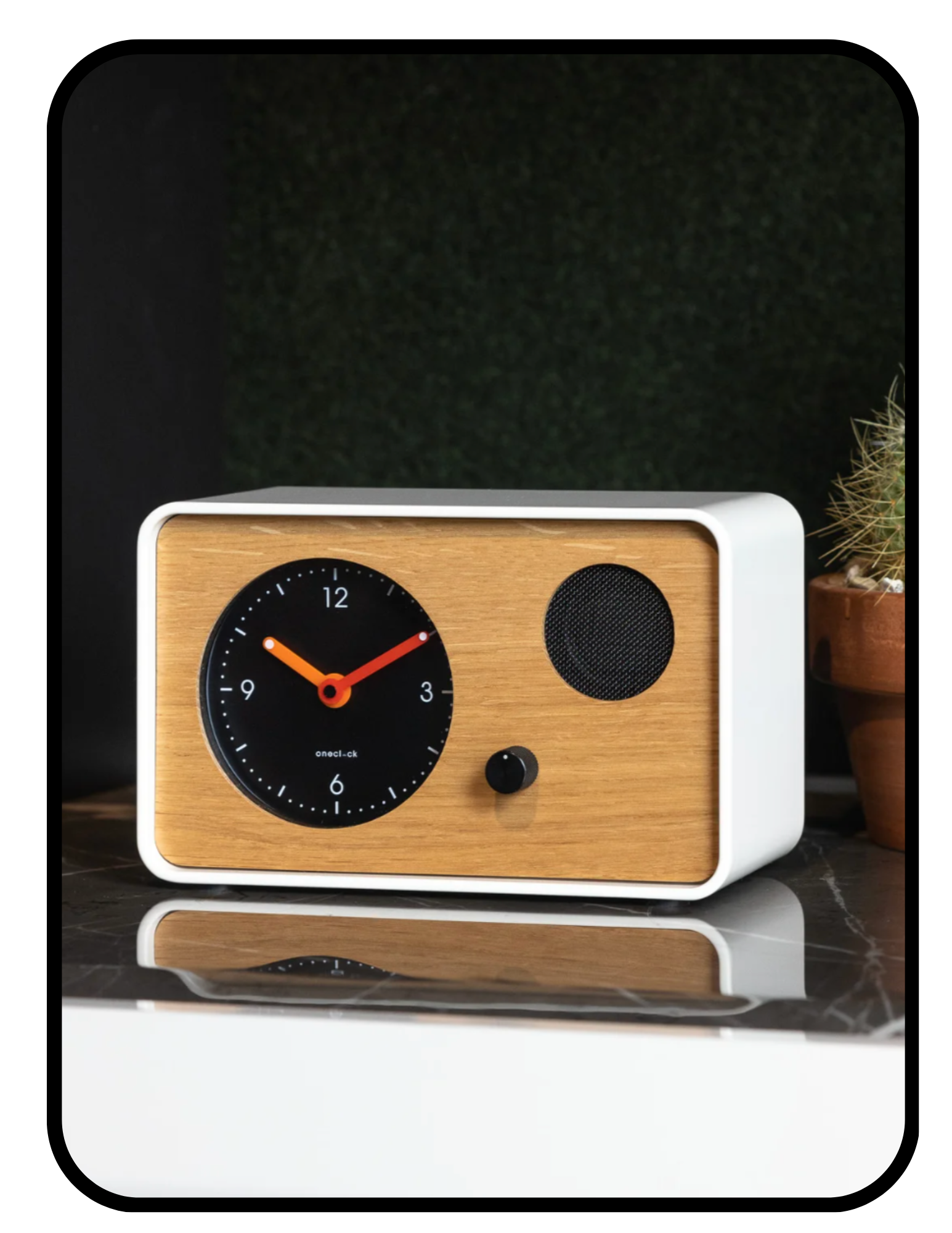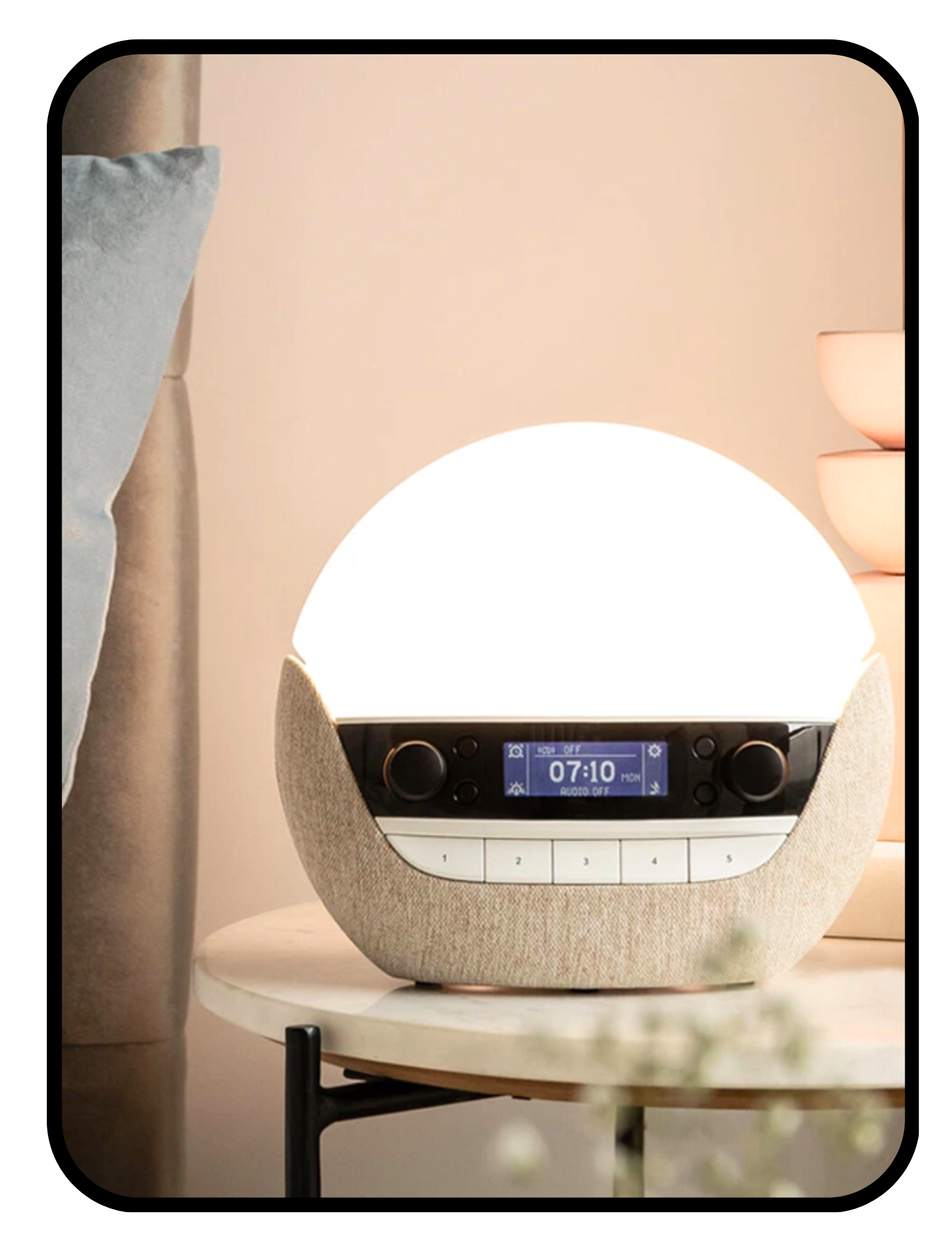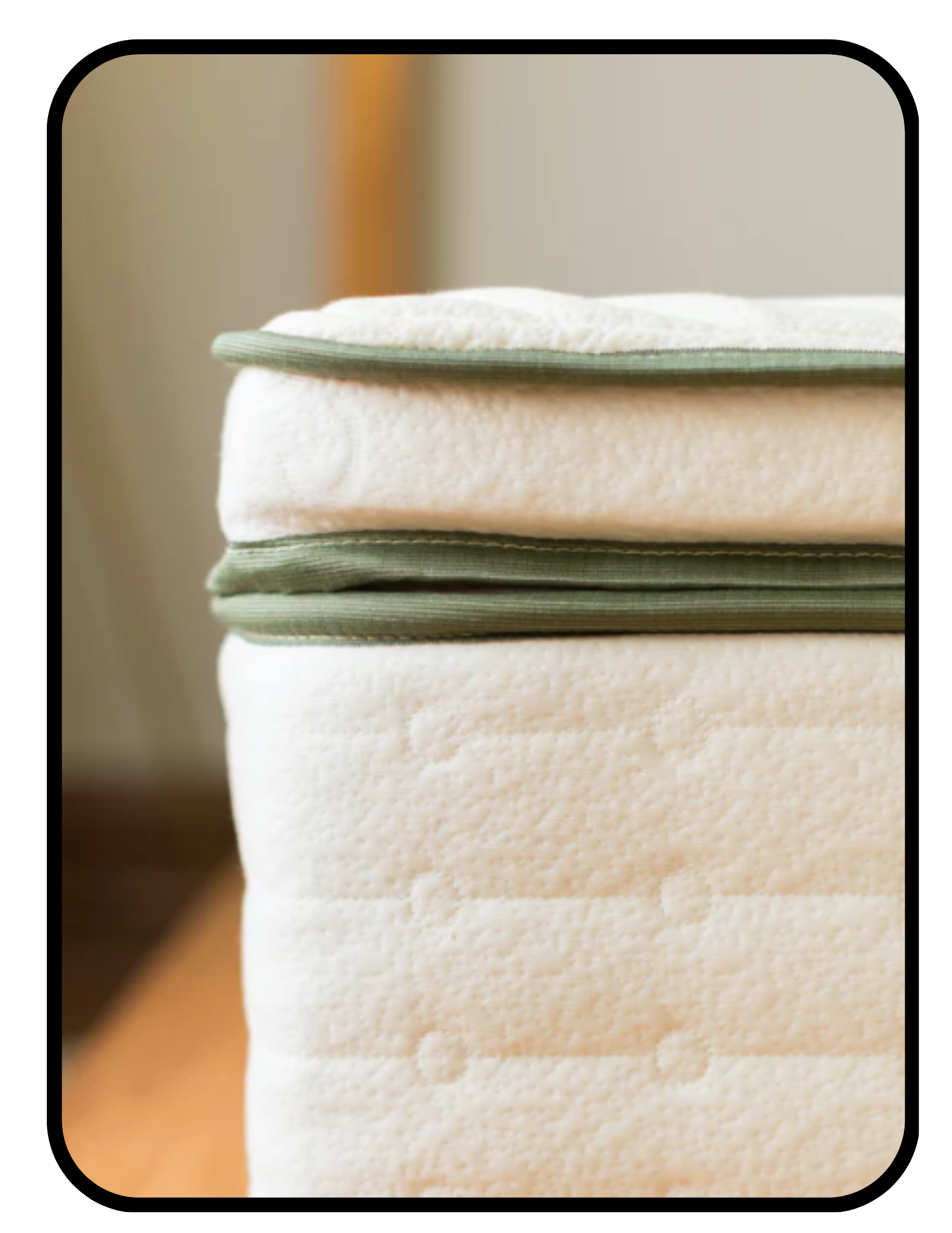Shop by Room ➜ Bedroom ➜ Alarm Clocks
Best Alarm Clocks for Health
The best alarm clock helps set your entire circadian rhythm— reducing distraction in the hours before bed, becoming totally quiet and dark at night, and gently waking you up with gradual sound or light in the AM.
If you don’t need a sunrise alarm, it’s still a good idea to get a dark, quiet alarm clock with gradual waking sounds. OneClock is the best analog alarm clock that can help make your bedroom a phone-free zone. It doesn’t tick, and wakes you up gradually with different, soothing music every day to keep your nervous system relaxed but alert. Made with healthy materials including wood and metal, making for a nice tactile experience. Really impressive features for setting wake-up times and has a tappable light if you need to see what time it is when it’s dark. I wake up around 7:30am, which where I live is still after sunrise (even in the winter) so have one of these on my nightstand, and it is sooo satisfying.
This is an inexpensive analog alarm clock to replace your phone and make the move to a digitally detoxed bedroom. It’s the best battery operated alarm clock, because it’s totally dark and silent at night, and never loses time if there’s a power outage. 80% plastic-free and also EMF free. Has a button if you need to see the time during the night. It has a traditional beep for waking, which isn’t gradual, but is relatively pleasant as far as beeps go. I used this for years, even while traveling. 10% off through through this Interior Medicine link is applied at checkout.
Sound Free Sunrise Alarm Clocks
This is the best alarm clock for heavy sleepers that don’t respond to loud noise, because these bulbs can get very bright and wake you up with light instead. You can program them to mimic a sunrise — eventually filling up the whole room with bright light. People who tend to sleep through noise report that this is a more effective method for them, but obviously test it out for yourself before an important wake-up ;). Essentially an alarm clock alternative, these bulbs obviously don’t have a built-in white noise machine or snooze features, but can be a phone-free alarm clock option that supports your circadian rhythm and fit into your existing bedside lamp.
A no-sound alarm clock option similar to programming your own light bulbs, but done for you already, and built into a cute bedside lamp. Gradually increases its sunrise alarm clock light to 1,300 lumens, which is a very bright light on par with a 100W bulb. Philips’ other, SmartSleep alarm clock, gets a lot of positive feedback for how bright it is, but there are lots of complaints about how difficult it is to set up and control, so this is a simpler option, and more aesthetically pleasing.
Analog Alarm Clocks
Sunrise Alarm Clocks with Sound
Loftie is the best sunrise alarm in my opinion. First, the circadian lighting — the display and lamp have a red light mode for the evenings, both go totally dark at night (and obviously, the lamp wakes you up with a simulated sunrise.) Second, it’s phone-free and has 6 built-in white noise options, sound baths, and guided meditations if you need help falling asleep or staying asleep. Third, the alarm sound starts gently, with nature sounds or your choice of other noise, if you need more than just light to wake you up, but don’t want to be startled. You can check the prices on their website here, or on Amazon here.
Lumie makes several great all-in-one sunrise alarm clocks. Like the Loftie, they don’t require an app or phone, reducing distraction and improving sleep. They also stay completely dark at night, and use low-blue LED light that mimics sunrise and sunset. They have multiple sound options including white noise and FM radio. It’s less aesthetic and sleek than the Loftie, but doesn’t require a separate lamp, which can be nice. They also offer a few different price points with different features.
Hatch doesn’t go completely dark at night, though you can set the display down to 1% and in pink, minimizing circadian rhythm disruption —nice if you like to see what time it is without having to reach out and tap. It also requires an app and WiFi to set it up, but you don’t need your phone with you in the bedroom once that’s done. Requires a monthly subscription for more sounds. Aesthetically pleasing, and has unwinding routines for evenings, white noise for nights, and gentle sounds paired with sunrises in the morning.
Mudita makes rechargeable analog alarm clocks with a little bit of a sunrise effect. The Mudita Bell, pictured above, has 10 gentle melodies with a small amount of warm light for enhancing your wake-up. Some of their other offerings include an e-ink screen (similar to a Kindle) and nighttime relaxation sounds. Not super bright, but a nice minimalist alarm clock with a few extra features, and you don’t need batteries.
More Healthy Design for You
More About How Alarm Clocks Affect Your Health
Even if you had one made of sea moss, the very concept of an alarm clock would still make it the least natural part of your bedroom. That said, we live in a world with time obligations, and most of us need a little help waking up on time. Here’s how to choose an alarm clock that works with your body as best as it can, without adding unnecessary stress.
Does a sunrise alarm clock work?
Yes, and potentially for a much cooler reason than you think. It turns out that our ability to see color may have arisen evolutionarily not to enjoy beautiful rainbows, but in order to sync our brains with sunrise and sunset. Millions of years ago, eyes developed the ability to see yellow and blue first — which are the dominant colors at sunrise and sunset— so we know when to wake up, and when to go to bed. This way, as we evolved, our body’s metabolisms were neatly synced with the earth’s 24 hour cycle.
All these years later, light is still the number one controller of your body’s entire 24 hour circadian rhythm. When you have to wake up before it’s dark, the best way to trick your brain into rising early may be a sunrise simulation, rather than noise. Your eyes sense the light, even if they’re closed, and your body will start to suppress melatonin— this naturally and gradually makes you more alert and awake.
Researchers in 2024 found that looking at alternating yellow-and-blue light was even more effective than looking at a bright SAD lamp (which contains primarily blue light, at very high intensity) in changing your circadian rhythm. Obviously, sunrise alarm clocks don’t flicker this kind of yellow-blue alternating light at you, but, they do emit yellow light, along with a more natural “sunrise colored” spread of wavelengths.
For some people, sunrise lamps work better than a regular alarm clock that makes noise, maybe because it mimics our evolutionary form of waking up on time.
Circadian rhythm, cortisol, melatonin, and your alarm clock.
Alarm clocks can affect your health in three main ways.
Light: what kind of light it emits, if any (red light, nighttime blue LED display, gradual sunrise), affects your melatonin levels and circadian rhythm.
Sound: the types of noise it makes (annoying tick, soothing white noise, gradual nature sounds, loud beeps) have impacts on your cortisol levels.
Distraction: a phone-free alarm clock can help minimize distraction, which also reduces cortisol and exposure to blue light
Is a glowing alarm clock at night bad for my health?
Yes. Your body is ultra-sensitive to even small amounts of light at night, and up to 14% of light still comes in through your closed eyelids. Light at night disturbs your circadian rhythm, which includes your sleep-wake cycle, but also many other processes in your body, like DNA repair and metabolism. This is why people with disturbed circadian rhythms or people exposed to light all night long (like night shift nurses) are at higher risk of cancer and weight gain.
Are loud alarm clocks bad for you?
Cortisol is naturally highest in the morning, peaking 15-40 minutes after you wake up, so you can meet the demands of the day. But, alarm clocks with aggressive beeping can raise it artificially too much, increasing your blood pressure and heart rate. On the other hand, waking up to a melodic noise has been shown to make you feel less groggy throughout the morning.
Is white noise at night bad for you?
Research is mixed on whether it helps people sleep, but in general, it seems to only be bad for you if it’s too loud. It can be beneficial because sudden noise, especially at night, can actually contribute to heart attack, and have negative impacts on cardiovascular health, including high blood pressure. This is because when you experience relative quiet, then hear a sudden noise like a plane, it causes a small spike in cortisol, your stress hormone. This happens automatically, and even while you’re sleeping. White noise can reduce this, if you live in a house or area that is prone to sudden, intermittent sounds like planes, neighbors, or other outdoor noise.
How quiet should my bedroom be?
To avoid negative health effects, your bedroom shouldn’t be any louder than 30 decibels at night, according to the World Health Organization, which has studied the negative health impacts of noise pollution. That’s about the same level of noise as rustling leaves.
Shop by Room ➜ Bedroom ➜ Alarm Clocks













